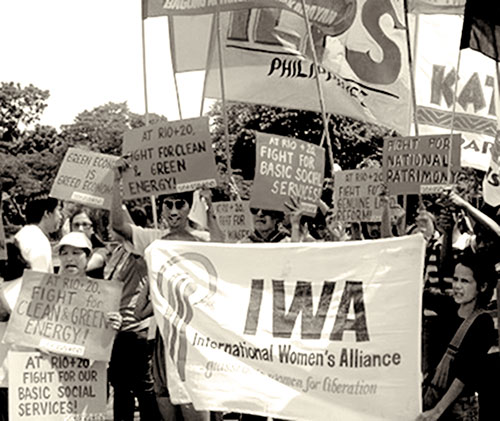



The International Women’s Alliance calls on women all over the globe to advance their ongoing struggles against imperialist globalization and the crisis of capitalism by mobilizing with militant actions on March 8, 2013, to commemorate International Working Women’s Day.
Since the economic collapse in 2008, the impact of the crisis on women all over the world has intensified. The capitalist system continues to unfold crisis measures to shore up the profits of the ruling classes, banks and corporations and maintain their global domination. These measures rely on the increased superexploitation of women in low-wage and precarious industries, devaluation of women’s labor, the robbing of the land and livelihood of peasant and Indigenous women, and escalating military intervention, repression and aggression.
As the profits of the 1% are increased and bonus checks are doubled in years of glaring crisis, women of the 99% are reeling under the weight of the crisis and saying ENOUGH IS ENOUGH!
Imperialist war and plunder have weighed heavily on women in the Middle East, Africa, Latin America and Asia Pacific regions and are increasing inside the imperialist centers of Europe and North America.
In Tunisia and Egypt, women have taken to the streets and are participating massively in uprisings against new imperialist-backed regimes that have betrayed promises of the Arab Spring. Palestinian women are integral to the resistance movement against U.S.-backed Israeli occupation and genocide.
Indigenous women of Canada have been leading a countrywide protest called Idle No More to halt renewed attempts by government to rob them of ancestral land rights and pave the way for the extractive industries.
Women in Ecuador, Guatemala and Mexico are confronting the same brutal corporations to protect their land, water and communities at tremendous cost to their safety. The rise of land grabbing and mass layoffs in Indonesia, because of the imperialist crisis, has forced Indonesian women to flock to developed countries to migrate and work as low-wage workers.
Therefore, women from Indonesia, Pakistan and India, to the Philippines and Brazil, demand genuine agrarian reform and an end to land monopoly and the rule of agribusiness.
The demand for low-wage labor in the Global North draws swelling numbers of women who are forced to migrate in search of work, and are swept up in labor trafficking and modern-day slavery. While government budgets for basic needs in health care, housing, education and social services are slashed, migrants and immigrants are scapegoated as a burden to the receiving countries and racism is fanned. Crackdowns and criminalization of migrants and deportation of refugees are rampant.
Nevertheless, immigrant and migrant women, women of color, are organizing in their workplaces, neighborhoods and communities to demand the right to decent lives. The recent strike of school bus drivers and matrons in New York, supported by community-based groups led by Latinas, exemplifies women’s ability to mobilize for their rights, the rights of their children and the rights of working people at large.
Black women workers, especially in the public-sector unions in the U.S., continue to be at the forefront of fighting back against reactionary right-to-starve, “right-to-work” laws that weaken and destroy collective bargaining.
As women rise up, the repression and violence against them rises. Recently, we have seen the three Kurdish women activists in Paris brutally gunned down with apparent impunity. Egyptian women in Tahrir Square, the famous site of the uprising two years ago, have been attacked, raped and beaten by armed goons to stop them from participating in protests. Similarly in India, the indigenous Dalit women fighting against land grabs are being hunted and imprisoned. In the Philippines, women of the National Democratic Front who were engaged in peace talks with the government have been in prison for years.
Women across the globe have risen to bring awareness of the different forms of violence against women, which is rooted in patriarchal values and maintained by the capitalist system, which thrives on discrimination and oppression of women and other marginalized populations. Women are demanding that all forms of violence against women must STOP!
During their March 8 actions, we invite women’s organizations to wear purple armbands or wristbands to show solidarity across actions globally.
End imperialist wars of aggression and intervention!
Genuine land/agrarian reform now!
Jobs paying union wages or livable income, health care, housing, education, food now!
No to racist immigration policies, police brutality and mass incarceration!
End deportations!
Stop forced migration and human trafficking!
Stop modern-day slavery and violence against women!
Free all political prisoners in developing and developed countries!
End political repression and human rights violations!
Special to Workers World The following is a press release issued on April 24, 2025,…
dear Larry Krasner, we heard you sued Elon Musk over his corrupt million election giveaways…
Unions join forces against harassment and deportation of members When 200 immigrant workers – from…
Larry Holmes First Secretary Workers World Party Dear Comrade, Under the assignment of the Central…
Download the PDF Black and white version All out for May Day! Students defend pro-Palestine…
By Jonas, Mutual Aid Scientific Socialism To the workers and free peoples of the world: We…